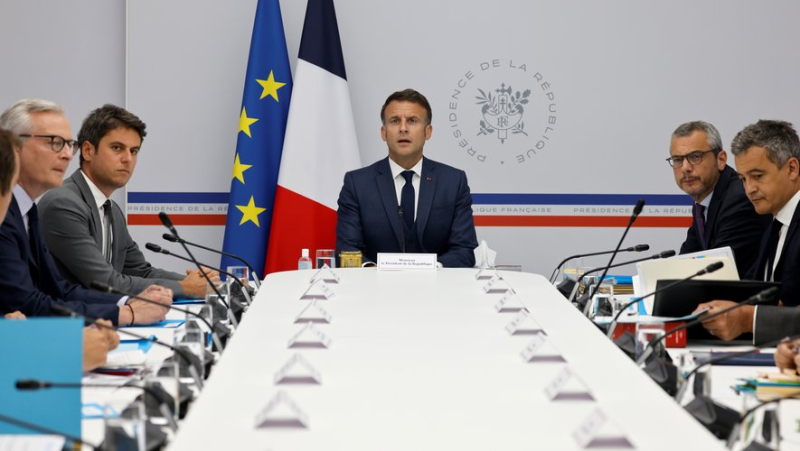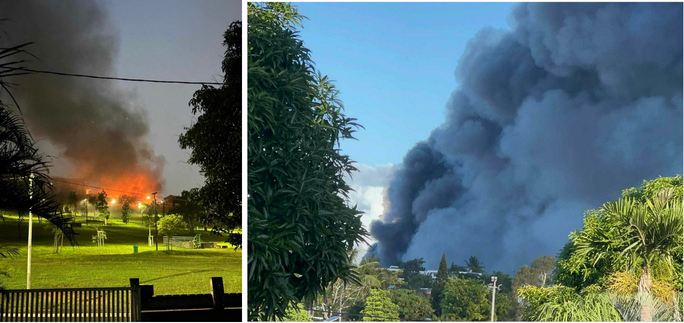Electoral reform, political mistakes, nickel crisis… in New Caledonia, the reasons for the anger

Emmanuel Macron a présidé le conseil de sécurité et de défense sur la Nouvelle Calédonie, le 16 mai. MAXPPP – LUDOVIC MARIN/POOL
The archipelago has been living to the rhythm of riots for almost a week. How did we get here ?
Shops destroyed, houses burned, dams… since Monday May 13, New Caledonia has been living to the rhythm of riots. Saturday evening, the human toll was 6 people dead, not counting the heavy material damage. How did we get here ?

The spark: reform of the electorate
By adopting, on the night of May 14 to 15, the constitutional bill modifying the electorate by 351 votes for and 153 against, the deputies ignited the powder. The Senate had already approved the text in April, sparking the first movements of anger in Nouméa, the first tensions between the most extreme independence activists, in particular the members of the CCAT, Field Action Coordination Cell, radical branch of the FLNKS, the Kanak Socialist Liberation Front and their opponents.
Since the Nouméa Accords in 1998, the electorate has been “frozen” : voting is reserved for voters registered on the referendum lists of that year and to their descendants.
The reform opens the electorate to all natives and all individuals residing for at least ten years in New Caledonia; 25,000 additional people can thus vote and risk putting the Kanaks in the minority. A maneuver for the separatists, who are considering the next provincial elections, scheduled for May 2024, to be organized before December 15, 2024.
Alerts: boycott, clumsiness…
By boycotting the third referendum on the future of the archipelago, in December 2021, the separatists, who asked for it to be postponed, had already recorded a much more worrying divide than ;rsquo;a mood swing.
Only 43.87% of residents went to the polls. They voted 96.50% in favor of remaining in the Republic, confirming the results of the referendums of 2018 (43.3% vote in favor of independence) and 2020 (46. 7% for independence).
After the drama of the Ouvéa cave, in 1988, the agreements of Matignon, the same year, then of Nouméa, in 1998, had brought appeasement. A series of blunders raised the tension.
Thus, by removing the Caledonian file from the lap of Matignon to entrust it to Sébastien Lecornu (Defense) in July 2020, then Gérald Darmanin (Interior) two years later, Emmanuel Macron committed a manifest error in a file where every word, every sign, every mark of consideration or contempt counts.
Three former Prime Ministers, Édouard Philippe, Manuel Valls and Jean-Marc Ayrault, interviewed on April 30 and May 2 at the National Assembly, as part of the bill expanding the electoral body, had asked that Matignon take over the Caledonian file.
By bringing into the government, in July 2022, Sonia Backès, loyalist president of the assembly of the South province, appointed Secretary of State for Citizenship of the second Borne government , Emmanuel Macron irritated the separatists. On September 27, 2023, Sonia Backès resigned: three days earlier, she was soundly defeated in the senatorial elections by a Kanak separatist, a clear message sent to the highest summit of the State.< /p>
By launching, as soon as the reform of the electoral body has been approved, an ultimatum to the two camps so that they agree on a status of the territory, failing which he would convene the Congress to ratify the modification of the Constitution, Emmanuel Macron precipitated the blockade.
Nickel: from economics to politics
The political crisis which is raging violently on the island masks another major issue, this one economic: the exploitation of nickel. Indispensable, in particular, for the manufacture of electric car batteries, the ore is the subject of all attention and all appetites in the world.
In New Caledonia, more than seven million tonnes are produced each year, or 6.5% of world production. Grande Terre, the main island of the archipelago, accounts for 20% to 30% of world reserves. However, despite an increase in global demand, overproduction from China is causing prices to fall. These have thus fallen by 45% in 2023, a difficulty for the 13,000 employees in the sector on the island (one in four jobs), but also a subject of tension between Paris and Beijing and between Emmanuel Macron and the FLNKS.
He had developed a perfect doctrine and control of the resource, undermined by the President of the Republic.




